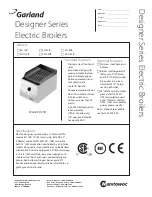
Benchmark 2500 - 3000 Boilers
CHAPTER 7 – MAINTENANCE
OMM-0094_0E
AERCO International, Inc.
•
100 Oritani Dr.
•
Blauvelt, NY 10913
Page
91
of
204
GF-137
Ph.: 800-526-0288
03/20/2014
Flame Detector Maintenance (Cont.)
3. Disconnect the flame detector lead wire.
4. Remove the two (2) screws securing the flame detector to the plate (Figure 7-2). The
flame detector is secured to the burner plate with one #10-32 screw and one #8-32
screw.
5. Remove the flame detector and gasket from the burner plate.
6. Thoroughly inspect the flame detector. If eroded, the detector should be replaced.
Otherwise clean the detector with a fine emery cloth.
7. Reinstall the flame detector and flame detector gasket.
8. Reconnect the flame detector lead wire.
9. Reinstall the shroud on the unit.
7.4 O
2
SENSOR
The O
2
sensor (part no. 61026) is located on the burner plate at the top of the unit (see Figures
7-1 and 7-2). The sensor may be hot. Allow the unit to cool sufficiently before removing or
replacing the O
2
sensor.
O
2
Sensor Maintenance Procedures
1. Set the
ON/OFF
switch on the control panel, to the
OFF
position. Disconnect AC power
from the unit.
2. Remove the top shroud from the unit by grasping the top handle and lifting straight up.
This will disengage the shroud from the four (4) pins in the side panels.
3. Disconnect the O
2
sensor lead wire by pushing in on the release tab and pulling apart the
connector.
4. Next, loosen and remove the O
2
sensor and crush washer from the burner plate using a
15/16" open-end wrench.
5. Thoroughly inspect the O
2
sensor. If eroded, the sensor should be replaced. Otherwise
clean the sensor with a fine emery cloth.
6. Reinstall the O
2
sensor and crush washer on the burner plate.
7. Reconnect the sensor lead wire.
8. Reinstall the shroud on the unit.
7.5 SAFETY DEVICE TESTING
Systematic and thorough tests of the operating and safety devices should be performed to
ensure that they are operating as designed. Certain code requirements, such as ASME CSD-1,
require that these tests be performed on a scheduled basis. Test schedules must conform to
local jurisdictions. The results of the tests should be recorded in a log book. See Chapter 6-
Safety Device Testing Procedures.
















































